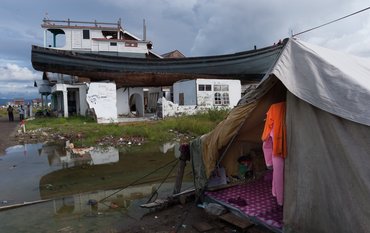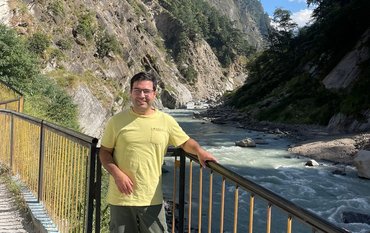On 12 and 13 July 2023, the International Training Course on Ocean Bottom Seismology with Amphibian Experiments took place at the GFZ .
The two-day course was organized by the Helmholtz Centre Potsdam – GFZ German Research Centre for Geosciences, the Alfred Wegener Institute – Helmholtz Centre for Polar and Marine Research AWI, and the University of Potsdam. 13 experts and peers from renowned institutions in Germany, Great Britain, the USA, Spain, Portugal and France contributed to the course. The 21 participants came from ten European and non-European countries.
The scientific training course was initiated by the steering committee of the German Instrument Pool for Amphibious Seismology (DEPAS). It is aimed at early career scientists who are interested in getting in touch with new and quickly developing research fields in seismology. The aim is to facilitate to access and use ocean bottom and amphibian pool data and to learn how to apply novel processing techniques.
Requirements and potentials of broadband seismology on the ocean floor
The requirements and potentials of broadband seismology on the ocean floor and experiments in the oceans were also discussed together.
The potentials include, for example:
- Investigation of continental margins (raw material->theme as well as hazard).
- Investigation of submarine volcanism (e.g. used by GEOMAR for eruptions in La Palma).
- Investigation of megathrust earthquakes, which can trigger tsunamis
- Seismic monitoring of pipelines
- Localization of whale herds
Background: Monitoring of the Ocean Floor
Seventy per cent of the Earth's surface is covered by water. The areas covered by the oceans cannot yet be well monitored seismically because no instruments can be permanently set up there. Measurements on the ocean floor pose a special challenge, because there is high pressure in this environment, sophisticated underwater technology is needed, and instruments cannot be directly exposed. Therefore, knowledge about these underwater areas is still very limited.
DEPAS – the German Instrument Pool for Amphibian Seismology
To counteract this, the DEPAS “Deutscher Geräte-Pool für amphibische Seismologie” / “German instrument pool for amphibian seismology” was established in 2005. This is a pool of broadband onshore and offshore seismological stations for long-term so-called amphibian measurements.
The pool actually contains 100 onshore stations, which are operated by the GFZ as well as 70 ocean-bottom seismometer (OBS) managed by the AWI.
The DEPAS instruments are available upon request for researchers affiliated to German universities or German research institutes within national or international projects. Applications for stations are evaluated by an external steering committee. Data will be stored in national archives and made available to the public after a waiting period.
For more information, see here:


![[Translate to English:] Gruppenfoto vor einer Gebäudewand aus Holz](/fileadmin/_processed_/e/7/csm_20230718_Trainingskurs-Ozeanbodenseismologie_IMG_1742_f97451951f.jpeg)


![[Translate to English:] Fire in a forest, smoke rising, aerial view from above](/fileadmin/_processed_/8/3/csm_2025_01_06_AdobeStock_415831729_5a0e6d50d3.jpeg)









![[Translate to English:] [Translate to English:] Abror Gafurov von dem Schriftzug "Welcome to Azerbaijan" und den UN und COP Logos](/fileadmin/_processed_/2/5/csm_2024_11_Baku_COP29_Abror_Gafurov_1042faec82.jpeg)


![[Translate to English:] Martin Herold standing in front of the library on the Telegrafenberg](/fileadmin/_processed_/c/d/csm_Martin_Herold_d385ee4dd9.jpeg)
![[Translate to English:] Many people are listening to a presentation in the GFZ lecture hall.](/fileadmin/_processed_/c/a/csm_1_Bild1_hell_b9c0e9f5ed.jpeg)






![[Translate to English:] Both scientists sitting on stools in front of a wall of books in the Telegrafenberg library](/fileadmin/_processed_/6/6/csm_Buiter_Castell_DORA_4_e87cb1ea18.jpeg)
![[Translate to English:] Gruppenbild mit 4 Personen](/fileadmin/_processed_/8/d/csm_20241017_GFZ-Emmerman-Medal-005_web_reinhardtundsommer_21a414fa4a.jpeg)






![[Translate to English:] Ice landscape with five red tents](/fileadmin/_processed_/8/9/csm_Zeltlager_auf_dem_Eis_Urheberin_Jenine_McCutcheon_5ced2d523b.jpeg)